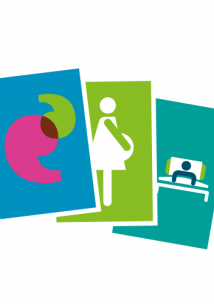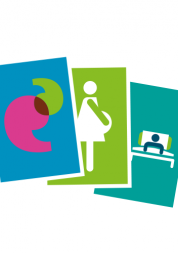Growing Healthy Consultation & Engagement Report for Stockton-on-Tees Borough Council

Summary
Healthwatch Stockton-on-Tees (HWS) collaborated with the Stockton-on-Tees Community Wellbeing Champions (SCWC) and Stockton-on-Tees Public Health (SPH) to support the review of the 0-19/25 Service.
The purpose of the engagement was to ensure that the voices of local children, young people, their families, and those involved in supporting them are central to the review and re-commissioning of the 0-19/25 service.
The Public Health vision is to enable children and young people with the building blocks to secure the foundation for a healthy life, working with families to promote wellbeing, protect from illness and injury and prevent ill health at the earliest opportunity through prevention and early intervention.
Since the commissioning of the current 0-19/25 service in 2018, the children’s landscape has evolved. The recent school system reform proposes that more schools are converted to academy status and operate differently. Additionally, the COVID-19 pandemic brought significant challenges which are still affecting many local children and young people, affecting their mental health and education. This is an opportunity for the public to give feedback to help determine the future needs of the service.
Working in collaboration, using combined resources and skills the aim of this work was to achieve a greater understanding of the needs of children and young people and the solutions required to ensure our children and young people (CYP) are supported with best start in life.
The consultation considered the following objectives:
- Work in partnership with children, young people, their families, people working to support them and the wider communities of Stockton-on-Tees.
- Challenge the existing 0-19/25 service and look for ways to improve.
- Identify unmet needs of CYP and their families.
- Shape the future service to better meet the needs of children, young people and their families.
- Measure satisfaction with the service.
The service areas that the consultation will consider are:
- 0-5 Health Visiting Service
- 5-19 (25 with Special Educational Need and disabilities SEND) School Nursing Service
- Children and Family Healthy Weight Service (Growing Well Growing Healthy)
Two surveys were designed, one for children and young people to complete from their perspective and the other was designed for 0-19 parents, carers, and families.
A total of 89 parents and carers and 9 young people completed the survey questions.
Findings
There was some positive feedback gathered about the existing Health Visiting Service, although lack of contact, accessibility and knowledge of support available was regularly raised throughout.
Communication and pathway difficulties were raised consistently regarding access to support, both from parents/carers with or without a diagnosis of SEND.
Although Family Hubs are seen as a great source of information, accessibility to them was raised as an issue due to travelling requirements and being out of area. Extending the hubs, with robust communication about what is available, more social activities, increased staffing capacity and embedding the Health Visiting Service would be seen as a positive outcome and a good use of the hubs.
Pathways for those with a SEND diagnosis and prior are not clear, those we spoke to would have benefited from better advice and communication about next steps.
There was a consistent message gathered that there is not enough provision for young people, such as access to a Youth Club or Gym outside of school hours.
The overall findings from the engagement, based on what young people have told us is;
Results from the Children and young people survey on the 0-19 service
- Only 44% knew where to get help if their family did not have enough food.
- When asked in their view how dangerous smoking, alcohol, vaping, and gambling were on health 78% thought smoking was very harmful, however 56% thought drinking alcohol and gambling were a little harmful and 22% were not sure.
- 78% of people knew who they would go to for help with alcohol, smoking, vaping and relationships, but only 55% knew where to go for help with weight management and 44% did not know where they would go for advice regarding LGBTQIA.
- The most popular answer for who the young people would go to for advice was a resounding 78% who would go to a parent or family member, closely followed by talking to a friend and 33% would look on the internet. No one said they would speak to a teacher or a school nurse.
- The most prevalent factor that would prevent a young person talking about their worries or concerns was lack of trust or a previous bad experience, embarrassment or not being taken seriously were also seen as important contributory factors.
- When asked what the best way would be to talk about worries with an adult who is not a parent or carer, the preferred options were in person or text messaging, with a definitive response was that it was NOT in school.
- Of the nine young people spoken to none were aware of having ever spoken to a school nurse.
Results from the 0-19 Parents, Carers and Families Survey
Health Visiting Service
- 21% of those providing feedback cared for children with SEND.
- 36% did not know what help was available for them or their child in their local area.
- 73% reported receiving help from the Health Visiting Service in the last two years.
- 77% of those who received help from the Health Visiting Service said that their needs had been met and 16% described their needs as not being met.
- There was positive feedback of the existing Health Visitor Service with 84% of people rating the service 3 or above (1=Low 5=High) describing the service as good overall.
- There was little knowledge of baby weighing services, one person told us they were advised to buy own scales.
- Better communication and a consistent Health Visitor would have been seen as helpful, with more face-to-face meetings. Various people provided feedback that their Health Visitor had changed and that this had led to disruption, some people reported still not having contact with a new Health Visitor. It was also stated that moving home caused additional disruption and there was concern “that people fell through gaps.”
- There was very little knowledge or awareness of breast-feeding support, weighing, weaning and behavioural support were also services that those we spoke to would have found helpful, they described how there was a lack of clear accessible information.
- Feedback was given to us those babies born during COVID-19 felt forgotten.
- Family Hubs were seen as a great source of information, it was echoed by various people that better signposting to Family Hubs would have been helpful.
- Father-specific support would be seen as advantageous.
School Nursing Service
- 94% of those spoken to had not received support from a school nurse.
- 5 people have said they had accessed a school nurse in the last two years of those 100% rated the service 4 or 5 (1 = Low 5= High).
SEND
- When asked ‘Thinking about the last two years. The service was able to support my child or children with their SEND needs?’ 73% said no.
- One person provided feedback detailing how they felt there was a lack of support after leaving school and their child now suffers with depression.
- Focused social groups for those with a SEND diagnosis seemed to be lacking.
Recommendations
Based on the findings, the following recommendations have been made:
School Nursing Service
- There is very little knowledge or awareness of a school nurse, schools to promote their service and provide detail of the school nurse offer.
- School Nursing service to provide regular updates to parents on key priorities and themes by form of e-bulletin/text message service.
- School Nurse to introduce themselves to parents/carers when children begin their educational pathway.
- Young people described ‘not’ wanting to access support via school, alternative pathways to be identified.
- Further exploratory work to be completed with young people to determine a new health and wellbeing offer.
- Those parents and carers we spoke to said there is not enough support for older children and teenagers. Access to social activities outside of school was considered important, together with financial support particularly during the cost-of-living crisis.
Health Visiting Service
- Consistent clear information to be provided, detailing the support available and how/where to access.
- Health visitors to be present at Family Hubs on a regular basis for drop-in clinics, weighing, weaning and behavioural advice.
- The family hubs were seen as a good resource, all parents, and carers to be given information at first point of contact.
- Specific support groups to be delivered within Family Hubs that provides behavioural advice and mental health support for parents and carers.
- Option of an email service for parents/carers to address some of the capacity issues.
Special Education Needs & Disabilities (SEND)
- Clear information to be provided to those seeking a potential SEND diagnosis to support with understanding the local area offer and next steps.
- Support groups to be extended throughout the local area to improve accessibility and raise awareness.
- Health Visitor visibility at Family Hubs to support initial questions and concerns.
- Clear communication about waiting times and delays to be provided and signposted to interim support groups.
- A support pathway that extends beyond school age would be beneficial.
- A directory containing information about what services are available upon initial diagnosis.
Downloads
Download a copy of the report below to read the full findings, plus a response from Stockton-on-Tees Borough Council (SBC).
If you need this document in a different format, please get in touch.
healthwatchstockton@pcp.uk.net
01642 688312
